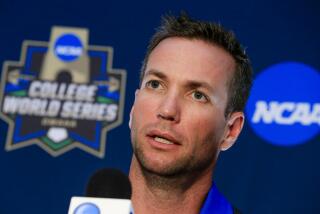No Sure Bet
- Share via
RENO — In January, NCAA officials, at the organization’s annual conference, declared war on gambling. They trotted out an FBI agent and a self-proclaimed former Mafia member to emphasize the danger to college athletics.
It’s now March and the Big West Conference tournament is under way in Reno. To the south, the Western Athletic Conference is playing in Las Vegas. Athletes are staying in hotels with casinos, walking right past legal sports books on the way to their games.
Will these conferences continue to come to these gambling centers for their marquee events? You can bet on it.
A week after a Cal State Fullerton student was charged with trying to bribe a Titan player to fix a game, Big West officials agreed to a two-year extension of the contract to hold its tournament in Reno through 2001.
“We are not minimizing the gambling issue,” Big West Commissioner Dennis Farrell said. “As we saw with the Fullerton situation, we should be very concerned about it. One thing you have to remember, whenever there is a college sporting event in Nevada, you cannot make a legal bet on the event.”
Sport books in Nevada do not take bets on events involving Nevada or Nevada Las Vegas.
Farrell and WAC Commissioner Karl Benson are adamant that playing tournaments in these cities does not contradict the NCAA’s stance on gambling. NCAA officials say they do not dictate policy on these matters.
“Those are not NCAA [playoff] tournaments,” said Wally Renfro, NCAA public relations director. “You have to see in the context of those conferences. Look at the options for them in terms of cities that can host those events.”
For the Big West, there aren’t many options. The conference tournament has led a vagabond existence since its inception in 1976. Beginning in the Stockton Civic Center, it was moved to the Anaheim Convention Center, the Forum, Long Beach Arena, then Las Vegas. But it had rarely showed a profit, or even broken even, until settling in Reno in 1996.
The city provides free hotel rooms, transportation and meals for all participating teams, plus guarantees the conference will net $190,000, according to Farrell. He also said the city supplies the arena, Nevada’s Lawlor Events Center, and the game management fees--including awards and officials--free of charge.
“That makes the event a no-risk venture on the part of the conference,” Farrell said. “No one has come close to that.”
Big West member Boise State has hosted NCAA tournament games in the past and will again this season. But Athletic Director Gene Bleymaier said the city would probably not be able to match Reno’s deal with the conference.
Athletic directors from UC Irvine, Cal State Fullerton, UC Santa Barbara and Long Beach State have discussed hosting the tournament jointly, according to Fullerton Athletic Director John Easterbrook. But he said those discussions were dropped when it became obvious the event would lose money.
The WAC does not have the same package in Las Vegas as the Big West has in Reno, but it’s good enough to keep the tournament there, Benson said.
“It’s a lucrative deal and Las Vegas is centrally located for all our universities,” said Benson, whose conference stretches from Hawaii to Houston. “It met all the criteria. Obviously, the gambling element causes some concern. We are concerned about the impact gambling has on student athletes, but we also have to realize it can be exaggerated in terms of that impact.”
Gambling is a $170 billion per year industry, FBI agent Tom French said at the NCAA convention.
In December, Steve Smith and Isaac Burton, former Arizona State basketball players, pleaded guilty to conspiracy to commit sports bribery for their part as players in a point-shaving scheme during the 1993-94 season.
Gambling scandals can reach all levels of college sports, according to NCAA officials. That was borne out when Jack Oh, a 21-year-old Fullerton student, was arrested last week and charged with trying to bribe a Titan basketball player to fix a game. The player, freshman center Corey Sanders, immediately reported the incident to school officials.
“We have pretty good information that there are campus bookie operations on most campuses,” Renfro said. “It doesn’t make any difference whether it’s a high-profile school or not. All these people are looking for is a way to manipulate the outcome of a game.”
Which leaves most university officials wary.
Irvine Athletic Director Dan Guerrero banned office pools when he took over in 1992.
“I felt this was not the appropriate place for that,” Guerrero said. “Our student athletes should not see those things going on and I decided to take a stand.
“We have recently seen more evidence that gambling issues can be right around the corner. We certainly don’t want to provide an environment where a student might think it is condoned.”
Such as in a hotel casino during a conference basketball tournament?
“If you could go down to a sports book and place a bet on a Long Beach State-Nevada game, I would have a problem with that,” Farrell said. “But you can’t. So there is no difference between Reno and Kansas City, where the NCAA is holding the women’s final four. Gambling is proliferating everywhere.”
More to Read
Go beyond the scoreboard
Get the latest on L.A.'s teams in the daily Sports Report newsletter.
You may occasionally receive promotional content from the Los Angeles Times.











